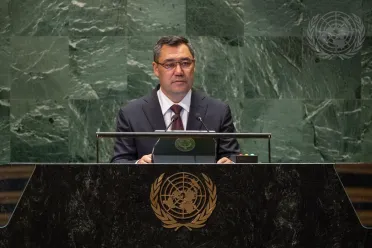Statement
Statement summary
SADYR ZHAPAROV, President of Kyrgyzstan, noting that the world is at a turning point, spotlighted increasing geostrategic competition between major Powers, the highest inflation rates and food prices in the last 60 years and geo-economic fragmentation. Expressing concern over declining trust between countries, he said that – on the contrary – current global challenges and risks such as climate change and growing inequality should unite the international community. Underscoring the need to build a multilateral system that prevents further geopolitical fragmentation, he asked those present whether international conditions were easier 78 years ago — when the United Nations “was just beginning its work” following the bloodiest war in human history — than they are today. Despite military-bloc thinking over past years, the UN has been — and remains — the most legitimate platform for diplomacy, and he supported it “as the only universal, intergovernmental, international Organization mandated by all Member States to find solutions” to the challenges that constantly arise.
Calling on such States to provide unconditional political support to the United Nations and its Secretary-General at this challenging time, he went on to point out that ongoing global processes directly impact Central Asia’s security and stability. Strengthening relations with regional countries is a natural priority for Kyrgyzstan, and he detailed his view of the region as a single geo-economic space, a geopolitical intermediary and a dynamic community that shares similar culture and history. On the path to full regional integration, however, it is necessary to resolve issues related to the legal delineation of State borders. Recalling armed clashes on the border between his country and Tajikistan in September 2022, he said that restraint and political will demonstrated by both sides prevented further escalation. He therefore emphasized that his country supports resolving controversial issues exclusively through peaceful diplomatic means, based on the principles and norms of international law.
Also detailing a border agreement signed with Uzbekistan in December 2022, he said that it facilitated mutually beneficial cooperation and peaceful coexistence. He then underlined the need for the international community to recognize that the people of Afghanistan are experiencing significant difficulties, amplified by the lack of a coordinated global stance on the situation there. Turning to the Sustainable Development Goals, he emphasized that the international community should not get lost in “economic intricacies” and, instead, ask whether humanity’s needs have been addressed and whether security, prosperity and well-being have been ensured. Problems such as extreme poverty and climate change can only be solved through a global, collective response, and the current reality is that developing countries face a dual challenge — the need to invest in development and, at the same time, adapt to climate change.
On that, he stressed the need to significantly increase the level of funding that meets the real needs of countries vulnerable to climate change. Kyrgyzstan reached out to its partners with a request to exchange external debt for environmental projects; however, Germany was the only country that wrote off debt. He also spotlighted the vulnerability of mountainous regions — 94 per cent of Kyrgyzstan’s territory — to climate change, calling for the creation of a broad coalition of mountainous countries that prioritizes climate adaptation and green transition. Noting today’s challenges, he quoted Jusup Balasagyn, who said about 1,000 years ago: “Our world is such that, in order to unlock the gates of truth, you must grasp its essence.” He observed that “nothing has changed since then” and — underlining the need to “see the world for what it is” — called for the UN’s transformation into a centre for global efforts to prevent conflict, reach compromise and establish peace.
Full statement
Read the full statement, in PDF format.
Photo

Previous sessions
Access the statements from previous sessions.
